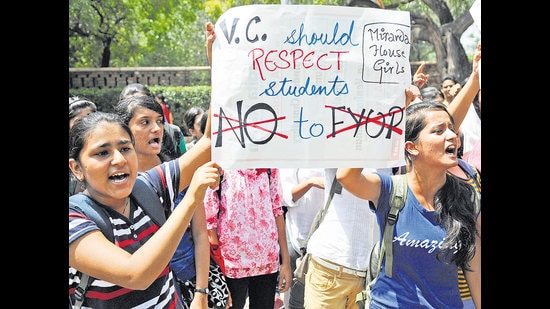Delhi University executive council gives final seal of approval for return of FYUP
Further, the university will also scrap MPhil from next year -- as per the NEP 2020 provisions -- and offer one- and two-year PG programmes from next year. Three of the 20-member EC disagreed with the proposals on implementing NEP-based reforms.
New Delhi: Delhi University’s executive council (EC), the varsity’s highest decision-making body, on Tuesday passed a slew of academic reforms ratified by the academic council last week, including reintroducing the four-year undergraduate programme (FYUP), which was scrapped in 2014 amid protests by teachers and students, and move to implement the 2020 National Education Policy (NEP) in the varsity from next year.

Further, the university will also scrap MPhil from next year -- as per the NEP 2020 provisions -- and offer one- and two-year PG programmes from next year.
“The one-year PG programme will be for students who have opted for four-year UG course. Students with three-year UG programme can opt for a two-year postgraduate programme from next academic session,” said EC member VS Negi.
Three of the 20-member EC disagreed with the proposals on implementing NEP-based reforms. “NEP is blueprint for privatisation and commercialisation of education, its implementation in DU will lead to destruction of leading public funded universities of India… It willl adversely affect the workload of teachers leading to further contractualisation and retrenchment of teaching faculties,” said the dissent note issued by the three members.
One of the EC members who submitted his dissent, advocate Ashok Agarwal, said it was “unfortunate” that a major restructuring was passed without responding to important issues raised by the members. “The merits of FYUP are not clear. Why should students pay for an additional year if the in-depth study of a discipline in a four-year UG course remains what it is today in a three-year undergraduate honours course,” he said.
Two EC members also dissented on the tripartite Memorandum of Understanding (MoU) signed between DU, Ministry of Education and University Grants Commission which was renewed this year. “Under this MoU, the university administration is committing to revise the fees of students, which will lead to fee hike in the situation of declining budgetary support in real terms. This will have far-reaching consequences in the public-funded universities like DU,” the note read.
However, Negi, who is a member of the right-wing teachers’ group National Teachers’ Democratic Front, said pointed out that the NEP was “passed by the AC and accepted by the EC”. “It is an avenue for expansion of higher education, aiming at an increase in gross enrolment ratio by introducing flexibility in the curriculum. The University has enough time for preparation and implementation of the NEP-based provisions. Workload, funding and expansion issues are there and the university should be vigilant in implementing the NEP in such a way that the number of teaching positions and funding is safeguarded,” he said.
In 2013, the university had introduced FYUP amid much fanfare as a pet project of the then vice-chancellor (V-C) Dinesh Singh. Following stiff opposition and protest from students and teachers, the programme was eventually rolled back in 2014.
On August 24, the university’s academic council passed -- amid dissent from 16 elected representatives -- the agenda to start FYUP along with multiple entry-exit scheme (MEES) and academic bank of credits (ABC) from the next academic session.
Under the FYUP programme, interested applicants will be allowed to choose from three UG options next year: a three-year honours programme, a four-year honours in a discipline or a four-year honours in a discipline with research.
The MEES-ABC combination will allow students to exit the course at the end of any academic year with credits in their “academic bank account” and later redeem those credits to pursue the course at any other university which comes under the ambit of the ABC system.
According to the policy document placed in the statutory bodies in DU, an entrance test will be conducted for lateral entry of students from other universities registered under the ABC system, whereas re-entry will be allowed for students of DU and its own colleges. The entry will be subject to the availability of infrastructural capacity in the institute.
Calling for a wider consultation process with stakeholders, DUTA president Rajib Ray also said, “The FYUP structure with MEES will increase expenditure towards the undergraduate programme. Students leaving the system without finishing the programme will always be treated as dropouts by the job markets. MEES will only increase attrition rate giving a false sense of a degree.”
During the Zero hour on Tuesday, the EC members held discussion on various matters including the delay in the release of grants in 12 Delhi government-funded colleges and the subsequent problems in disbursal of salaries, absorption of ad-hoc and temporary teachers, and demand for health card for all the teachers.
EC members also discussed about providing financial assistance to students who lost their parents to Covid-19 and allowing appointments for foreign adjunct faculty to increase international collaborations in the university.
Meanwhile, DU teachers’ association (DUTA) held an online demonstration to protest against the e-learning promoted through these reforms.




